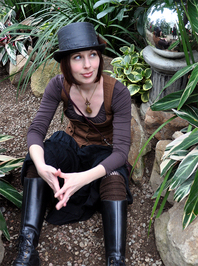 Things are looking pretty great for Cherie Priest. In 2010, Boneshaker, the first book in her Clockwork Century series, won the Pacific Northwest Booksellers Association Award, the Locus Award for Best Science Fiction Novel, and was nominated for a Hugo Award for Best Novel. Last year, the movie rights to Boneshaker were acquired by Hammer Films, which is partnering with the same company that produced “The Ides of March” and “Black Swan.”
Things are looking pretty great for Cherie Priest. In 2010, Boneshaker, the first book in her Clockwork Century series, won the Pacific Northwest Booksellers Association Award, the Locus Award for Best Science Fiction Novel, and was nominated for a Hugo Award for Best Novel. Last year, the movie rights to Boneshaker were acquired by Hammer Films, which is partnering with the same company that produced “The Ides of March” and “Black Swan.”
While Boneshaker sequels Dreadnought and Ganymede ventured away from the Pacific Northwest, Priest’s latest book in the series, The Inexplicables, keeps readers within the walled-in part of Seattle that contains blight, a toxic gas that turns people into the living dead. This time, though, something more threatening than “rotters” has made its way into the district. “Newcomers can pick up The Inexplicables without any substantial difficulty,” said a review in Shelf Awareness. “But there’s an extra layer of enjoyment if you know the backstory–and its three predecessors are just such fun, anyhow.”
As an author and staff writer for Subterranean Press, Priest is working on strict deadlines these days, but she was generous to answer some questions from Lindsey McGuirk, of Village Books.
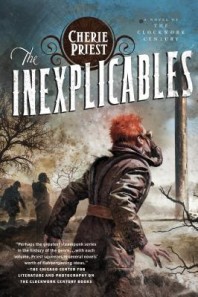 LM: Zombies are prevalent in pop culture and books. Going into writing the books in the Clockwork Century series, did you worry about trying to stand out from other books of that genre?
LM: Zombies are prevalent in pop culture and books. Going into writing the books in the Clockwork Century series, did you worry about trying to stand out from other books of that genre?
CP: Typically speaking, I don’t worry about how my work fits in or stands out. I just try to tell stories to the best of my ability.
LM: So would you say that you’re writing for yourself?
CP: Not entirely. I’m absolutely happiest with an audience, but as a general rule, if you waste a bunch of time trying to write things to please the market, you’ll never get anywhere.
LM: You moved back to the South this year after being in Seattle for six years. In your acknowledgements in The Inexplicables, you write a couple things that make it sound like you never quite felt at home in Seattle. Was the case?
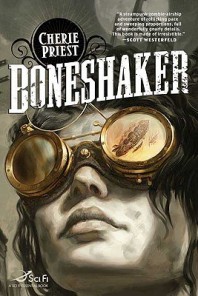 CP: Seattle was very kind to me in a great number of ways, but no, I never really got comfortable there. I couldn’t get the hang of the climate or, for that matter, living in the middle of a big urban center. I also was thousands of miles away from my family and my oldest friends. I missed weddings, babies, and almost a funeral due to the time and expense of traveling back East. Even in the middle of the city, with a lovely writing community and some dear friends, I felt painfully isolated.
CP: Seattle was very kind to me in a great number of ways, but no, I never really got comfortable there. I couldn’t get the hang of the climate or, for that matter, living in the middle of a big urban center. I also was thousands of miles away from my family and my oldest friends. I missed weddings, babies, and almost a funeral due to the time and expense of traveling back East. Even in the middle of the city, with a lovely writing community and some dear friends, I felt painfully isolated.
LM: Did your lack of comfort influence you in using the city as the setting for a series about war and zombies?
CP: Honestly, no. I wanted to write a book set in Seattle because I lived in Seattle, and had gotten to know it well enough to write about it. That desire collided with my interest in writing some American steampunk. Seattle has oodles of wonderful local history to be mined, so I mined it.
LM: I love that you call zombies “rotters.” It leaves little to the imagination. How did you settle on that word?
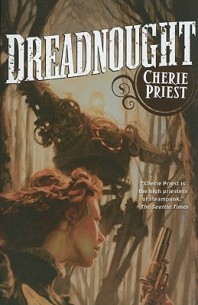 CP: Arbitrary convenience. Couldn’t call them zombies. Couldn’t think of anything else.
CP: Arbitrary convenience. Couldn’t call them zombies. Couldn’t think of anything else.
LM: Why couldn’t you call them zombies?
CP: Because the word didn’t enter the American popular lexicon until the 1920s. Other than that, it was a term with a specific, and not entirely overlapping, meaning in African and Caribbean religion that no one in the Pacific Northwest would’ve had any reason to know.
LM: A friend and I were talking about the Clockwork Century books and how they’re dubbed as being part of a “steampunk zombie” series, although neither of us necessarily see the books as steampunk-centric. With so many sub-genres within the sci-fi genre, how would you describe your books? And is there a particular sub-genre of sci-fi that appeals to you?
CP: I don’t mind when people call them steampunk; they were specifically conceived as American steampunk, as opposed to all the UK-centric steampunk out there. Not that there’s anything wrong with UK-centered steampunk. Far from it. I just didn’t see any good reason that I couldn’t play with 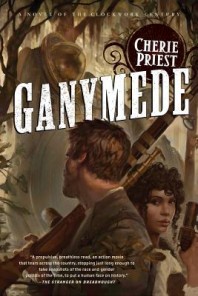 the genre in my own backyard.
the genre in my own backyard.
LM: How are American and UK-centric steampunk different?
CP: That’s somebody’s Ph.D. thesis waiting to happen.
LM: Do readers ever point out things that they think aren’t logistically possible in your books?
CP: All the time. And they’re right. But, as I like to tell people, if you’re a huge stickler for scientific or historic accuracy, these probably aren’t the books for you.
LM: How do you know when you’ve written something that is good?
CP: I have no idea. Some of my favorite stories are the least popular, and some of my least favorite stories are the most lauded. Apparently I am an awful judge of my own material.
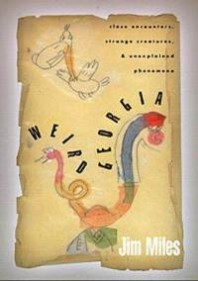 LM: Well, just assume that what you think is awful is going to be raved about. And vice versa. Or, just believe that all of your writing is bad. Then all of it will be well-received.
LM: Well, just assume that what you think is awful is going to be raved about. And vice versa. Or, just believe that all of your writing is bad. Then all of it will be well-received.
CP: Here’s hoping! Because I constantly have doubts about all of it.
LM: Whose writing do you admire?
CP: That’s like saying ‘Name a famous blonde.’ Too many to cite. I’d go on all night, and still kick myself in the morning for having left people out.
LM: Would it be easier to name a famous blonde? We could play it Family Feud style. So what are you currently reading?
CP: Right now? A book called Weird Georgia, about weird people and unexplained events in Georgia. And a lot of LOLcat tumblrs.
Lindsey McGuirk is Village Books’ Digital Marketing & Publishing Coordinator. She also handles the store’s online marketing and works with authors to get their books published on the print-on-demand Espresso Book Machine.


